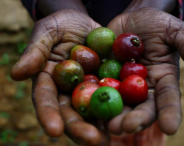
SRI LANKA – “We lost all our resources due to the war. Now we do not have jobs to earn money. Farming is our only source of livelihood–and out only alternative is ecological agriculture, which does not require money for inputs.” These are the words of a farmer in Vavuniya, in Northern Sri Lanka.
He is part of a group of 20 men and 30 women (20% of whom are young people) who turned to farming when they could not find jobs once the civil war ended. Unfortunately, the long war and the extensive use of agrochemicals had destroyed the environment and had a massive impact on the health of local farmers; may of them were suffering from chronic kidney disease. A farmer from the community said: “Today, our farmers, especially the men, are dying of kidney disease. We found out that this is due to extensive use of agrochemicals over a long period of time. It is therefore time for us to shift to alternative agricultural practices.”
In 2016, these 50 farmers started farming using organic practices. Through the MTCP2 programme, the local farmers’ organization provided them with seeds and plants and conducted awareness-raising workshops on ecological farming.
While it is still too early to note any considerable increase in income, the farmers are now saving money that they would have spent on farming inputs had they continued farming using common practices, and their families are consuming safe, chemical-free vegetables at home.
The next challenge lies in marketing their organic produce and this is what the local farmers’ organization will tackle now.
About MTCP2
The Medium Term Cooperation Program Phase 2 (MTCP2), a five-year capacity building program supported by the International Fund for Agricultural Development (IFAD), the Swiss Agency for Development and Cooperation (SDC), and the European Union (EU), has been implemented in 19 countries across three sub-regions—Southeast Asia, South Asia, and the Pacific—engaging 1,544 sub-national farmers organizations (FOs) with a total membership of around 22 million farmers. The funding support (total budget of $ 5 million for the whole duration of the project across 19 countries) serves as a catalytic fund that will allow FOs to enhance their capacity to be effective channels of economic services to farmers. So far, the program has contributed to the formation of strong national platform of FOs with improved capacity to engage in policy processes and mobilize resources from mainstream agricultural development programs like extension services, credit, and pre and post harvest facilities. The program also helped in transforming farmers associations into commodity-based cooperatives to strengthen the role of small-scale farmers within an inclusive and sustainable value-chain. The program is being implemented by the consortium Asian Farmers’ Association for Sustainable Rural Development (AFA) and La Via Campesina (LVC). ###

Comments are closed